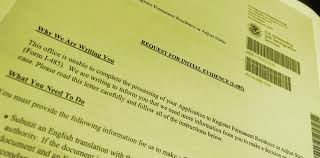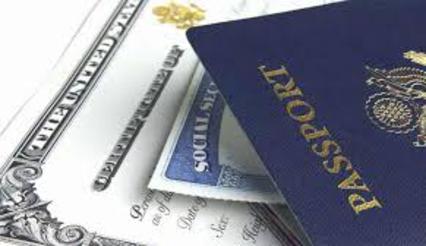POSTING DATE: July 9, 2018
Learn More About:
Immigration News & Updates eNewsletter © 2011 - 2018
For questions about U.S. Residency, Green Cards and Immigration Visas, Visit our Website at: www.ImmigrateToday.com or call our office at: (954) 382-5378
Check Out This Cool Stuff For Immigrants....
Immigration
Questions & Answers
This Week's Immigration News
Question: I am Jamaican and have recently reconnected with my dad who moved to America many years ago when I was only 3 and we never really had any contact all that time until now. Seems my dad went to America to work and he and my mom lost touch over the years. But when his dad (my grandfather) passed away recently, he came back home for the funeral and since that time we have been in touch trying to reestablish a relationship together. He’s now a citizen and wants me to come to new york and live there with him and his wife. I am 19 and my mom agrees but says my dad needs to file for my immigration papers. He says that he saw a lawyer and was told that since he and my mom were never married, it would not be possible for him to sponsor me. Is that true?
Answer: This is a great question and is often the source of a lot of confusion in immigration. Immigration regulations allow fathers to sponsor their children whether or not they were married to the child’s mother. However, in cases where the father was not married to the child’s mother, in addition to proving the biological and legal relationship, the father must also prove that he had a true father/child relationship with his child, provided support and showed care and concern for the child until he or she reached age 18. This includes proof that either the father lived with the child or if not, that he paid regular child support, participated in the child’s life, provided for the child’s medical or educational expenses, etc.. Establishing the father/child relationship for immigration purposes can often be very difficult, even in the best cases, requiring extensive documentation of child support, photos, affidavits and other evidence.
Unfortunately, in your circumstances, where your father effectively abandoned you and did not provide either financial or emotional support while you were growing up, it is likely impossible for him to be able to sponsor you for immigration purposes. The issue is not that he and your mother were never married, instead, it is his failure to provide for your welfare. I know it is extremely unfair that you should be penalized for his lack of responsibility, but under the law, he would likely not be deemed to have had a bona-fide relationship with you during the requisite period. I hope this is helpful to you dear. If you need more clarification, please feel free to give me a call and we can go over it in detail.
What Is A USCIS Request for Evidence And How Do I Answer It?
Helpful Immigration Tips You Can Use...
Immigration News & Updates eNewsletter
eNewsletter
After filing an immigration application, the USCIS issues a receipt (called an I-797 Notice of Action) within about a week. Depending upon the type of application filed, the USCIS may begin processing the application within several months or as long as ten years or more. Once an officer does begin reviewing the application, he or she may either approve or deny it, or if more evidence is needed to make a determination on the case, may issue what is called a “Request for Evidence” (RFE).
An RFE is a letter that the USCIS officer sends to an applicant in order to request additional information or documentation while processing an immigration application. RFE requests are generally issued for outdated forms, missing information or documentation required to establish eligibility for the benefit requested.
Immigration How To:
How Do I Prove That I Paid Child Support So My Naturalization Will Be Approved?
Quick Overview of the Immigration Process
for Adult Children of Citizens
Adult children of U.S. Citizens are in immigration categories which usually take many years to wait for an Immigrant Visa in order to immigrate to the U.S.. The process can be frustrating and not easily understood, so a run-down of the how the Immigrant Visa process generally goes as follows:
1)Your Parent files a Family petition with the USCIS
Failure to provide proof of child support payments is one of the most common reasons that Naturalization applications are denied every day. This often happens even when a parent has actually paid child support, but simply fails to provide evidence of payments. Generally, Residents must show that they have “Good Moral Character” in order to be eligible for U.S. Citizenship.
This covers the preceding five year period prior to applying for Naturalization for most Residents, and three years for those eligible to apply for early Naturalization through marriage to a U.S. Citizen.
U.S. Citizens can expedite immigration and customs processing at Miami and other major U.S. airports by using the “Mobile Passport Control (MPC)” Cell Phone App. Under the U.S. Customs and Border Protection (CBP) program, you can use the app to submit your passport information and customs declaration forms via smartphone and tablet prior to going through inspections. Once you download the app, set up your profile, answer the CBP questions, and submit. The app will provide you with a digital barcode, which you can use when going through customs, by simply showing your passport and barcode receipt on your phone or tablet. Android and iPhone users can download Mobile Passport for free from the Google Play Store and Apple App Store.
It’s Hurricane Season Again, Digitize Your Vital Immigration
Documents To Keep Them Safe!
Failure to properly respond to an RFE is one of the most common causes for denial of an immigration case. In such a case, for example, let’s say a U.S. Citizen mother files an I-130 application to sponsor her single adult daughter in Colombia. The immigrant visa waiting line is about 7 years, and the typical USCIS processing time for such an application is about 4 years or so. Once the application is filed and the USCIS receipt is issued, nothing generally happens until the case is sent to an officer for processing in about 4 years time. Once the officer reviews the case, he finds that the mother only attached a copy of the child’s baptism certificate and failed to provide a copy of her daughter’s birth certificate as required. The officer issues an RFE requesting that the child’s birth certificate be provided showing her mother’s name and if the document is not in English, an English translation must be provided and gives the mother 87 days to respond. Once the mother receives the RFE she sends the officer a copy of the child’s original birth certificate in Spanish, but fails to send an English translation. In that case, the officer denies the case, since he is not required to provide the mother with a second opportunity to provide a document which he had already requested.
Responding to an RFE from the USCIS
Always read the RFE letter very carefully to determine exactly what kind of evidence or document is being requested. Some RFE's are more complex than the others and it is difficult to determine and some are simple and easy to understand. For more complicated RFE letters, you may want to retain an immigration attorney to assist you. Once you have determined exactly what the letter is requesting, be sure to provide the exact document requested.
For instance, an officer may request a “long form” of a Birth Certificate. If you respond that you do not have one, your case will likely be denied. The appropriate action to take is to request one from the departmental authority in your country of birth.
How much time do I have to respond to an RFE?
Depending on the type of case, you may have from 33 days to 87 days to respond so that the USCIS receives your response before the expiration date. To be on the safe side, you should always send your response by Express or Priority Mail and get a delivery confirmation. Never send any communications to the USCIS via Certified Mail, which takes much longer and can risk your response being received late. Finally, remember that your response to the USCIS officers request must be RECEIVED by the USCIS ON or BEFORE the deadline. Responses received even one day late result in complete case denials.
After I respond-what happens next?
Depending upon the case, it could take up to 60 days or more for the USCIS to resume processing your case . You can check the online status to see if it is stating that your RFE response has been received, or call the USCIS 800# to ask if the computer shows the USCIS received it. For adjustment case (I-485) requests, the officer may wait to receive your response before continuing processing of your Work Authorization application which will cause delays in its issuance. To avoid this, send your response as soon as possible and do not wait until you get near the deadline in the letter.
If you have a scanner, you can digitize your documents by scanning and saving them on an online “cloud” like carbonite, even a free service like dropbox. If you don’t have a scanner, take clear pictures of your documents using your cell phone. Each document should be a single photo.
2) Original Documents: Originals should be kept safely together in a file and enclosed in a zip-lock bag or other waterproof container or safety deposit box at your local bank.
3) Document Copies: Copies of all your documents should also be placed in a zip lock bag and should be easily accessible.
Now that hurricane season is upon us, it’s a good time to start taking steps to safeguard your Immigration and other important documentation to prevent potential loss due to natural disasters such as hurricanes and water damage.
1) Copy and Digitize Documents: Be sure that you always make a copy of the entire immigration petition and supporting documentation BEFORE sending to the USCIS and make copies of all receipts, notices and correspondence to and from the USCIS as well. Similarly, make copies of Birth, Marriage & Citizenship Certificates, Divorce Decrees, Green Cards, Passports, I-94 cards, Driver’s License, home and car insurance, car registration, healthcare cards, mortgage statements and other important papers.
U.S. Citizens Can Breeze Through Airport Customs By Using The Mobile Passport Control App!
Question: I filed for my daughter in the Bahamas back in February 2012 when she was married, but now she and her husband are divorcing. I am wondering if you can handle the case and get her to immigrate to the US sooner once the divorce goes through. Also, she has 2 children, ages 11 and 18, would my grandkids be able to come along with her as well? We are afraid my 18 yr old granddaughter will not be eligible anymore as a minor. Thank you so much attorney.
Answer: Yes, once your daughter’s divorce is final, we can contact the National Visa Center (NVC) and have them upgrade your daughter’s case from the F3 Immigration category for married children of U.S. Citizens to the F1 Immigration category for adult single children of U.S. Citizens. The F1 category includes minor children up to age 21. So you don’t need to worry about your granddaughter, she will likely be able to immigrate along with your daughter. Right now, there are immigrant visas available in the F1 category for I-130 petitions which were filed in April of 2011. You filed for your daughter in February 2012, so once we convert her case to the faster route, there will still be a few more months for her to wait in order to begin the final immigration process. I will email you a list of the documents you will need to provide me to covert the case, which will include a copy of the certified divorce decree and birth certificates for your children.
Question: Me and my citizen wife just got married a few weeks ago. We want to file for my residency papers and are getting the documents together. My question is this, since there are so many documents we need to include in the application, can we just scan everything and put it on a USB drive, along with our digital photos and send that to immigration along with the applications? That way the immigration will have everything in case they need to reprint it. Thanks.
Answer: No, unfortunately, the USCIS still operates in the “stone ages” and most cases require lots of paperwork, nothing digital. Even your photos must be on traditional photo paper. You must provide clear copies of all the required documents. Keep your originals safe, as you will need to take those to your marriage residency interview. Good luck!
Question: We filed my wife’s immigration case and since I am on disability and I don’t file taxes, we had to use a joint sponsor for the affidavit of support. We filled out the form and sent all his information in. Now we got a letter from the immigration service saying that they want me to file the affidavit of support. I already explained in a letter that I don’t make enough money to qualify because of my disability, so why are they still asking for the form?
Answer: Regulations require that the U.S. sponsor provide a fully completed, signed form I-864 Affidavit of Support (in most cases except those involving a U.S. Citizen parent filing for a minor child). This is true even in cases where the sponsor does not meet the minimum financial requirements and has to have a Joint-Sponsor file an I-864 affidavit. In such cases like yours, you still need to complete and sign the form I-864 affidavit and provide documentation to prove your income, like your disability benefits letter. I hope this is helpful.
2)I-130 Receipt issued by the USCIS
3)USCIS processing time currently takes about 4 -8 years, depending upon whether you are married or single
4)USCIS issues I-130 Approval Notice to your Parent
5)USCIS transfers the case to the National Visa Center to put the case in the queue waiting for an Immigrant Visa to be available (according to determinations made by the State Dept) as reflected in the monthly Visa Bulletin
6)National Visa Center (NVC) sends letter to U.S. Citizen Parent indicating that the case is pending visa availability
7)Nothing happens for many years while waiting for Immigrant Visa availability.
Adult, Single children of U.S. Citizens called 1st Preference have to wait approximately 7 to 8 years. Adult, Married children of U.S. Citizens (and their spouse & minor children) called 3rd Preference have to wait approximately 11 to 12 years or more.
8)Finally, after many years, when an Immigrant Visa becomes available, the NVC notifies the U.S. Citizen parent that Fee bills must be paid in order to prepare the case for Consular Processing
9)Once Visa and Affidavit of support fee bills are paid, consular forms and original documents must be submitted to the NVC along with the Affidavit of Support and financial documentation
10)Once all required documents are submitted, and the NVC file is complete, it sends the file to the U.S. Consulate to schedule the Immigrant Visa interview
11)The U.S. Consulate notifies the Immigrant of the Immigrant Visa appointment and provides instructions on having the required medical examination done.
12)The Immigrant (and his or her family) attend the Immigrant Visa appointment at the U.S. Consulate and if all goes well, the case is approved and the Immigrant receives a package in the mail which must be presented to the U.S. Immigration officials at the airport upon entering the U.S. . Prior to entry, Immigrant visa fees must be paid online and the receipt presented to prove payment.
13)The Immigrant and family receive their Green Cards at the address in the U.S. provided within about 30 – 120 days and then proceed to apply for Social Security numbers from the Social Security Administration. Congratulations!!!
One of the main Citizenship requirements for a parent who does not live with his or her minor children, is demonstrating payment of support for all children whether in the U.S. or outside, until the age of 18, for the past five years. This is required whether or not there is a Court Order for child support payments. The standard is that if you are a parent and do not live with your minor children, you still have the moral responsibility to support them, even if the custodial parent does not require you to do so. This corresponds with Question 30 H of the Naturalization application asks “Have you EVER Failed to support your dependents of to pay alimony. Even when a Resident ticks off “No”, if the application lists minor children living at any address other than that of the applicant, the USCIS will generally ask for proof of child support payments for all children under the age of 23 at the time of filing the application, since you only need to prove Good Moral Character for the past five years, and payments for children up until they turned age 18. For example, if you apply for Naturalization and you have children ages 17, 19 and 24, you would need to provide evidence that you paid child support for the 17 year old for the past five years and the 19 year old for four years until the child turned age 18. No proof would be required for the 24 year old.
Naturalization applicants, who do not provide adequate proof of child support payments at their interview, later receive a USCIS notice from the officer, requesting that the additional documentation be provided. This is often a total shock to many applicants, who were not aware of the requirement to provide proof, believing that since there is no child support order from the court, they are not required to show payments. Many applicants fail to provide any or all the documents requested, which usually results in denial of the case and loss of the USCIS filing fee.
In Florida, the simplest case to prove is one in there is a court order for child support and the applicant makes the payments through the Florida Department of Revenue. This way, there is a record of every child support payment and the applicant can get a printout showing of all support payments and provide that, along with a certified court order for child support. Those who are in arrears and are not current on child support payments, should wait until they are caught up before filing for Naturalization. Other proof includes copies of wage garnishment deductions from paychecks, cancelled checks or other proof of monthly payments.
It gets a little tricky, however, for applicants who don’t have a court order from the U.S. or other country and don’t make formal payments through a government system. In such cases, applicants should provide proof of payments for the required period, through Cancelled checks, Money Order receipts, Western Union (or other money transfers) receipts or transcripts (a history of payments by wire transfer can be ordered from western union and other companies for up to five years or more) and a notarized letter from the custodial parent that all child support has been paid and is up to date, along with a copy of their proof of identity, like driver’s license, passport biographic page, etc.
Residents who plan to file for Naturalization in the coming years, who are not currently making formal child support payments should begin to do so immediately. For those without court orders making payments inside the U.S., its best to get a signed, notarized agreement with the custodial parent, which sets out an exact monthly payment to be made. Then, make only formal, check or money order payments and save the receipts for each one, make sure and write child support on the memo line. That way, if the custodial parent later refuses to provide a letter confirming that child support is up to date, the applicant will have proof of the agreement and of all payments made. The same advice goes for those with children abroad. Get a formal agreement between the parents and begin sending regular monthly Western Union or other transfers directly to the custodial parent, not to any other person’s name. Finally, never, ever, ever pay cash! There is no evidence of payment and even if a custodial parent writes a letter confirming child support payments, a USCIS officer can still request evidence of payments.
Proving payment of child support can be particularly problematic for those with children abroad in the Caribbean and other countries, where there is usually never a court order for child support and payments are often made casually, not formally. In a typical case, a father may pay for a child’s school, clothes other expenses, but not pay child support to the mother directly each month. In these cases, it can often be very difficult to prove child support payments. For those currently supporting children in this matter who intend to apply for Naturalization in the near future, the best advice is to start paying support in a regular, formal manner. Send monthly Western Union or other payments in regular amounts and only send in the name of the custodial parent, not in the name of another person or family member, since there is no proof that the funds were actually paid to the parent for child support. Keep a log of the date and amount and a copy of every transfer in date order so that you don’t have to sort through them later.
The key to success with Naturalization and any other immigration matters is to learn what the requirements are and plan carefully to make sure that all the requirements are met before applying. Filing an application without this knowledge and preparation can in some cases, end up being a waste of time and money. This is especially true for proving child support, since it often requires extensive documentation, affidavits, receipts, Western Union transaction reports, which take time and a lot of effort to assemble. So the best approach is to have the documents available before filing the case.
We can assist you in understanding what documents you will need to provide in your particular case, and properly present it to the USCIS on your behalf, just give us a call for a free consultation at: 954-382-5378.













